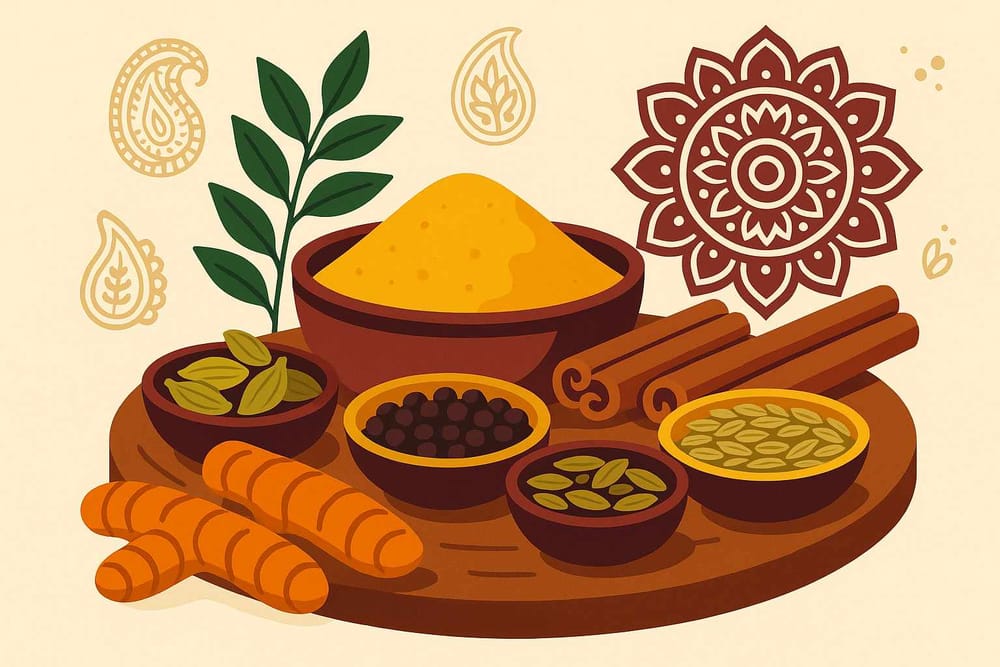
Traditional Spices in Ayurveda: How They Enhance Health and Wellness
Ayurveda, our ancient Indian system of health and wellness, uses spices not just for flavor but for their incredible healing properties. These spices are deeply connected to balancing our body's energies – the doshas – Vata, Pitta, and Kapha. From improving digestion to boosting immunity, Ayurvedic spices hold a treasured place in our traditions and daily lives.
The Foundation of Ayurveda and the Significance of Spices
Ayurveda views health as a beautiful harmony of body, mind, and spirit. Spices are not mere seasonings; they are powerful tools to address imbalances in the doshas. Ancient texts like the Charaka Samhita and Sushruta Samhita highlight their therapeutic importance.
Each spice has unique qualities – its taste (*rasa*), energy (*virya*), and post-digestive effect (*vipaka*) – that determine its impact on our bodies.
- Warming spices like ginger help balance Kapha by stimulating digestion and increasing internal heat, which is particularly helpful during colder months.This gentle warmth can also help reduce bloating and gas.
- Cooling spices such as fennel are ideal for soothing Pitta, helping to calm excess heat and inflammation in the body.Fennel can also help with digestive issues like heartburn and indigestion.
- Blending spices, like in our beloved garam masala, enhances their overall potency through synergy, creating a balanced effect on the doshas.Each spice contributes its unique qualities, creating a complex and harmonious blend.
Spices in Ayurveda also have a spiritual significance, often included in rituals to promote positivity and well-being, adding a layer of sacredness to our daily lives.
Turmeric - The Golden Healer
In Ayurveda, turmeric, or *Haridra*, is more than just a spice; it's a sacred herb with auspicious and therapeutic properties. Its golden hue symbolizes purity and well-being.
The active compound, curcumin, is celebrated for its powerful anti-inflammatory and antioxidant benefits. It supports liver detoxification, strengthens immunity, and promotes radiant skin, bringing a healthy glow from within.
A warm glass of *haldi doodh* (turmeric milk) is a comforting remedy for colds and coughs passed down through generations.
Many families use turmeric mixed with sandalwood as a natural skincare routine. This fragrant paste can help with acne or pigmentation, reflecting the wisdom of traditional beauty practices.
Turmeric is also used in religious rituals to purify spaces and protect against negativity, connecting us to the spiritual dimension of well-being.
Ginger - The Universal Medicine
Ginger, or *Ardraka*, is truly an "all-season remedy" in Ayurveda. Its warming properties make it ideal for balancing Vata and Kapha, especially during the colder months.
Fresh ginger tea, a staple in many Indian homes, is a wonderful way to stimulate *Agni* (digestive fire). It eases indigestion, bloating, and nausea, bringing comfort and relief.
A small piece of ginger with rock salt before meals is a simple yet effective practice to aid digestion, promoting healthy gut function.
Ginger decoctions, often paired with honey, are a time-honored remedy for coughs and colds, passed down through generations.
Cumin - The Digestive Dynamo
Cumin seeds, or *Jeeraka*, get their name from the Sanskrit word *Jeerna*, meaning digestion. They are truly a cornerstone of Ayurvedic cooking, balancing all three doshas with their gentle yet powerful properties.
Cumin stimulates digestive enzymes, reduces bloating, and cleanses the gut, promoting a healthy digestive system.
Cumin water is a refreshing drink, often recommended after childbirth to aid digestion and support lactation, reflecting the wisdom of Ayurvedic postpartum care.
Roasted cumin powder in buttermilk (*chaas*) is a cooling and satisfying summer drink, helping to balance Pitta during the hotter months.
Cardamom - The Queen of Spices
Cardamom, or *Elaichi*, is treasured for its fragrant aroma and medicinal value. It harmonizes Kapha and Pitta doshas while uplifting the mind, bringing a sense of balance and tranquility.
Chewing on cardamom pods after meals aids digestion and freshens breath, a simple and natural way to complete a meal.
Cardamom’s cooling nature makes it beneficial during hot weather and for balancing Pitta, bringing a sense of coolness and calm.
Black Pepper - The King of Spices
Black pepper, or *Maricha*, is the "King of Spices" in Ayurveda because of its strong therapeutic properties. It enhances bioavailability—known as *Yogavahi*—helping our bodies absorb nutrients from other spices and herbs more effectively.
Black pepper's warming nature helps clear respiratory congestion and manage colds, providing relief during the colder months.
Practical Tips for Using Ayurvedic Spices
To incorporate these wonderful spices into your daily life:
- Understand your dosha: Identify your primary dosha to choose spices that best complement your unique constitution.This personalized approach ensures you're using spices in a way that supports your individual needs.
- Freshly ground is best: Use freshly ground spices whenever possible for optimal potency and flavor. The aroma itself can be uplifting and therapeutic.Invest in a good quality spice grinder to make this easy and enjoyable.
- Proper storage: Store your spices in airtight containers in a cool, dark place to preserve their therapeutic properties and vibrant flavors.This helps maintain their freshness and potency for longer.
- Simple remedies: Prepare simple home remedies like cumin water or ginger tea for daily use. These are easy to make and incorporate into your routine.Start your day with a warm cup of ginger tea or sip on cumin water after meals.
- Spice up your cooking: Include these spices in your everyday cooking or enjoy them as teas to experience their holistic benefits.Experiment with different spice combinations to discover new flavors and support your well-being.
Using spices mindfully bridges the gap between tradition and modern wellness. For a deeper dive into the world of Bhakti, spirituality, and traditional wisdom, explore Bhaktilipi.in. It's a treasure trove of resources that can enrich your spiritual journey.
About Bhaktilipi
Bhaktilipi is your digital haven for sacred texts, devotional stories, and poems that inspire Bhakti. We offer meticulously curated translations and original works, making timeless wisdom accessible for today's readers. Whether you seek traditional knowledge or fresh perspectives on spirituality, Bhaktilipi helps you connect with your roots while staying relevant in the modern world. At Bhaktilipi, you'll find enriching content on topics like the role of traditional spices in Ayurvedic practices and their significance in health and well-being.
Why Subscribe?
Stay updated with insightful new posts, features, and reflections that will deepen your spiritual journey. Subscribe to our newsletter or follow us on social media:
Join us in exploring Bhakti and beyond!
Embracing the Wisdom of Ayurvedic Spices
Ayurvedic spices are more than just ingredients; they're time-honored treasures for health, balance, and vitality. Rooted in the wisdom of our ancient traditions, they offer a natural path to enhance wellness while connecting deeply with India's rich cultural heritage.
FAQs on Traditional Spices in Ayurveda
What are some common traditional spices used in Ayurveda? Traditional spices in Ayurveda include herbs and condiments like turmeric, ginger, cinnamon, black pepper, cardamom, and cumin. These are revered for their medicinal qualities and used to balance the body's energies, or doshas. You can explore more about their individual benefits and uses on Bhaktilipi.in.
In what ways do Ayurvedic spices enhance health and wellness? Ayurvedic spices improve digestion, strengthen the immune system, and reduce inflammation. They contribute to detoxification and enhance mental clarity, contributing to overall well-being. Articles and resources on Bhaktilipi.in offer deeper insights into these benefits.
Is it safe to use Ayurvedic spices every day? Generally, Ayurvedic spices are safe for regular consumption in moderate quantities. They are natural ingredients and form a part of daily cooking in many Indian households. However, it's always wise to consult an Ayurvedic practitioner for personalized advice.
Which spice holds the most significance in Ayurveda? Turmeric often takes the spotlight due to its potent anti-inflammatory and antioxidant properties. It's valued for supporting joint health, improving skin, and boosting immunity.
Can Ayurvedic spices assist with weight management? Yes, spices like cinnamon, ginger, and black pepper are known to support weight management efforts by improving metabolism and potentially aiding fat burning.
Why does Ayurveda stress the use of spices in cooking? Ayurveda emphasizes spices because they not only enhance the taste of food but also provide therapeutic benefits. Spices help balance the doshas, improve digestion, and harmonize bodily functions. You'll find a wealth of information on this topic on Bhaktilipi.in.
How do Ayurvedic spices aid digestion? Spices like cumin, coriander, and fennel stimulate digestive enzymes, reduce bloating, and promote regular bowel movements. They are particularly helpful for those with sluggish digestion.
Can traditional Ayurvedic spices be used in herbal teas? Absolutely! Spices like ginger, cardamom, and cinnamon are wonderful additions to herbal teas. These teas help detoxify, soothe the mind, and provide warmth, especially during colder months.
A passionate group of people dedicated to preserving India's knowledge of Dharma, Karma, and Bhakti for ourselves and the world 🙏.
